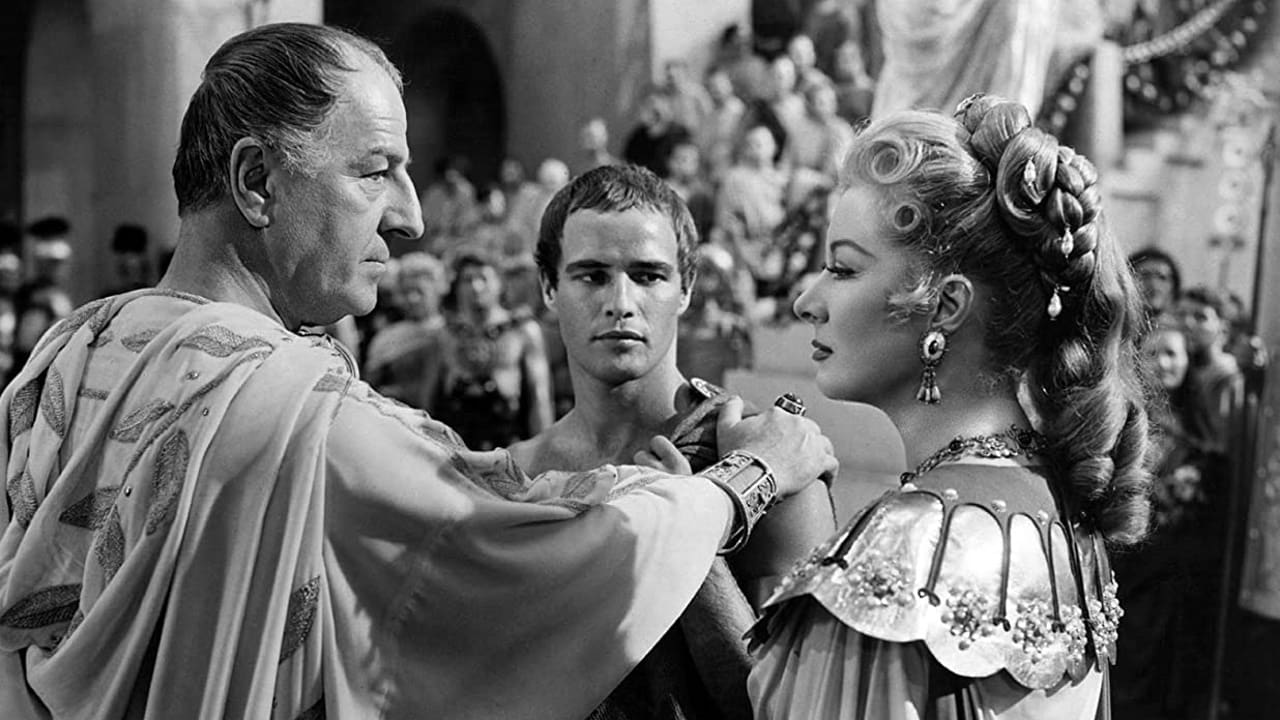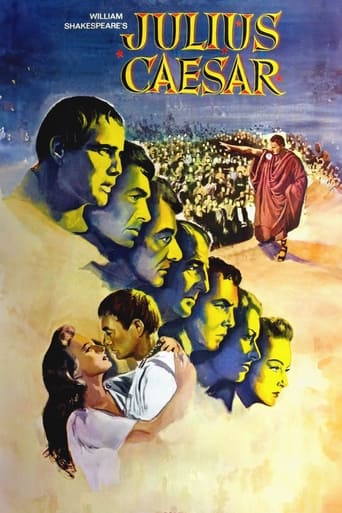

This is How Movies Should Be Made
... View MoreSERIOUSLY. This is what the crap Hollywood still puts out?
... View MoreMost undeservingly overhyped movie of all time??
... View MoreThis is one of the best movies I’ve seen in a very long time. You have to go and see this on the big screen.
... View MoreJulius Caesar, the classic story of power corrupting and what happens when it's usurped, is the stuff of a near-masterpiece in 1950's Hollywood. The direction is elegant and timed just right to get the performers on their beats and delivering more and then some. Interesting to see the intensity so LARGE on the fronts of both fronts of British classical-trained theater (John Gielgud, as the most psychologically pathological character, Cassius, fully delivering the goods, plus James Mason being his Mason-iest) and the Method (Brando, seeming like he's always been in these robes - at least this week).It's Shakesepare on Golden-age Hollywood scale, but it's kept intimate when it counts, and the material is allowed to shine fully. This is the Godfather of political dramas, and so many, many lines have been taken into just everyday grammar; aside from the 'fault is not in our stars' line, listen for others like ' O pardon me, thou bleeding piece of earth' or 'it was Greek to me'. And yet it's not simply that these actors get some of the meatiest-dramatic lines ever written, like in the history of all civilizations, but that this is all about what it means to have, take, live with, demolish and get back or keep protected Power, with a capital P.It's almost unfair to give a proper review to the film after seeing it once, as certain big set pieces - or even a couple of the conversations that Cassius has with Brutus or the other Roman senators plotting the death of their "beloved" Caesar - are quite dense with visual touches and details of performance. When Brando has his major set piece (he's not in as much of the film as you might expect, but his presence is felt more, which seems to be a thing with Brando character), addressing the crowd devastated over the loss of their ruler, it's a pinnacle of acting. He isn't just talking to no one, or to himself. He's making it very personal, all the more sad and that the revenge against the betrayers all the more stronger. How to sway a crowd is the name of the dramatic angle here, and it's the stuff of the best Hollywood dramatic acting, writing and direction (and art direction too, what sets) could offer.Is it perfect? Maybe not. The final battle is good but almost, to me, a little short, as if Mankiewicz steps up to make an epic conclusion, but decides to side-step it as if he isn't totally trusting in his capabilities (that would come later, one supposes, with Cleopatra as far as BIG epics went). And yet the final moments with Cassius and Brutus are so effective it makes one want to say nevermind. Especially Gielgud impresses here, with a role that requires a lot of forceful talking, bordering on yelling, with declarations and insinuations and other things - as big as his acting is, just as with Brando and Mason to an extent, though he kind of pulls it back when he can (see the tent scene between Brutus and Cassius before battle), there's subtleties there, little moments you can see the actor working through the emotional logic first, the dense Shakespeare poetry second.As with many Shakesepare movies, it may help being familiar with the play ahead of time to get all of the words and idiosyncracies of the Bard prose. But as far as just the core story goes, it's the stuff of legend. Surely one of those films of the 50's, along with On the Waterfront and Streetcar, where you can run it in an acting school and it might almost be enough to show the movie without any lecture to understand how to command attention from a partner, the audience, the whole world.
... View MoreIt would have been quite helpful if I had read the play 'Julius Caesar' by William Shakespeare before seeing this film, but I am not an avid reader. I do enjoy this kind of majestic English though, but to really get every word of it, I'd need to see it again... and again, and again. So, perhaps this is a 'classic in the making' for me.The story is carefully set up (well, of course...), with some outstanding monologues that really... stand out, yes. For instance the one by Marlon Brando in the market place - with the body of Caesar (and the crowd) at his feet - it is simply captivating. All the other roles are as much enjoyable, with the particular mention of James Mason playing the quintessential Brutus.The battle scene at the end is also worth a separate mention. It is not the best action scene I've ever seen, but it has its own charm and you can just tell how much work must has gone into it. Sort of a cherry on top, if you will.'Julius Caesar' is a thoroughly enjoyable oldie, one which may get more points from me when I've seen it again (and again) and more of the dialogues and monologues have had their chance to bloom.
... View MoreWell, the Ides of March has come to General Julius Caesar (Louis Calhern) in Joseph Mankiewicz's 1953 film version of William Shakespeare's play based on the real life Roman figure. The movie is the story of how Julius Caesar met his fate with the Senators whom fears the worst can come to Rome as his dictatorship come into play. Brutus (James Mason) is a man stuck in the middle between his beliefs of being loyal to Caesar and the peer pressures of the Senators lead by Cassius (John Gielgud) whom wants to get rid of Caesar. Brutus emerges as the most complex character in the film and is also the play's tragic hero. In his soliloquies, the audience gains insight into the complexities of his motives. He is a powerful public figure, but he appears also as a husband, a master to his servants, a dignified military leader, and a loving friend. Brutus's rigid idealism is both his greatest virtue and his biggest flaw. Public Self versus Private Self term plays in Brutus's mindset. Much of the play's tragedy stems from the characters' neglect of private feelings and loyalties in favor of what they believe to be the public good. Similarly, characters confuse their private selves with their public selves, hardening and dehumanizing themselves or transforming themselves into ruthless political machines. He wants to do what is good for the people, but questions himself if it means getting rid of the man that help him on the way to power. John Gielgud is magnificent as Cassius, and James Mason is a fine Brutus. But Marlon Brando, more than anyone or anything else, compels attention. Brando's casting was met with some skepticism when it was announced, as he had acquired the nickname of "The Mumbler" following his performance in A Streetcar Named Desire (1951), but he prove them wrong with his role as Mark Antony. Just watch his two speeches. One is the 'Cry Havoc! Let slip the dogs of War' and the other is the speech to the public. Brando had little or no experience with verse, and there are points in this speech where more such experience would have served him well. But his fierce passion transcends all that. Brando's passion surpasses any rules he misses with this piece, this is the type of acting that can excuse the rules of Shakespeare. He is so alive and real you know he created some great circumstances to get through those lines! Antony's rhetoric and delivery is over 9000. Now I see why Marlon Brando was legendary. He is a powerful speaker. There are certain things that the film does do right. Julius Caesar gives detailed consideration to the relationship between rhetoric and power. The ability to make things happen by words alone is the most powerful type of authority. Words also serve to move hearts and minds, as Act III proofs. The movie is powerful, but it's does have faults. One of the biggest things I wish the movie had was color rather than black and white. It's not like they couldn't do it at the time, as many movies were in color. Don't get me wrong, I like Black and white movies, but this movie has an epic Roman Era theme that could have work better than Director Henry Koster's Biblical sword-and-sandal epic The Robe that also came out that year. The Roman Empire in this film seem lost in black and white with its bland look. Technicolor could have the sets, props and costumes and production values would have been shown off to much greater advantage in color, like its predecessor, Quo Vadis (1951). The movie also suffers from a lot of misinterpretations and misreadings that confused the audience with its text. It's really hard to understand what they are saying if one does not read a lot of Shakespeare. Shakespeare did this on purpose, so that confused the characters in the story speaking to each other, but also cause a lot of people to shake their heads wondering what does he mean with that? At less in Shakespeare's Julius Caesar, it manage to avoid any cheap good or evil scheme like in Richard III but does justice to all the characters and their motives. I would give it a watch for any Shakespeare fan, but it's not for everybody. Movies like this are acquired taste. No way was it better than Orson Welles's Macbeth, but it's still a great watch.
... View MoreWhat sustains for years in power the most heinous political, it is your choice at any cost to get rid of whoever, and however, arising as an obstacle in its path, is its ability to make alliances with anyone who decides to favor them, although then be paid more than favors or betray with creeping attitude, and is, among other things, his capacity to lie higher than the maximum power and its decision to keep the deception even touch them on the most sacred oath. It is well known that, the most heinous acts committed against humanity have gestated in government halls and men who will have earned monuments. And all the outrages that have perpetuated the poverty of people screaming, without being silenced, in the walls of the houses of government. How little faith had, the great playwright William Shakespeare, in the statesmen! "The abuse of greatness, he said, occurs when separating the clemency of power." And historians tell who was drinking from the source of Plutarch that came the idea of talking about the Romans. ¡And what a nested area in which corruption and lies, and how good an example for the rest of the story! The result is a book that dazzles with its magnificent language with its presentation of vivid characters and contradictory, that impact and shake, as Marcus Brutus, Mark Anthony and Cassius. The first and last, with a desire that transcends personal affection for the common benefit. And the second, ready to cozy up to anyone and promise the impossible, to preserve power. Joseph L. Mankiewicz achieves a very tight film adaptation that preserves the full taste of Shakespearean language and displacement, and achieving more than satisfactory characterizations, especially in the roles of Marlon Brando (Mark Anthony) and John Gielgud (Cassius). A sober atmosphere, use a tight black and white, and a dramatic atmosphere of calculated intensity, which leads us to feel with great force throughout the English writer's pessimism against everything that involves the name of state policy.
... View More